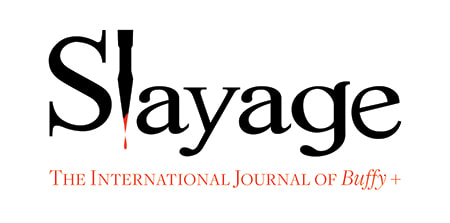ISSN 1546-9212
|
Call for Papers: Deadline Extension
Twentieth Anniversary Slayage Special Issue Ananya Mukherjea, guest editor, and Rhonda V. Wilcox, editor of Slayage, invite submissions of papers for a special issue to be published late in 2021, marking the journal’s twentieth year. This issue seeks to reflect and reassess at this pivotal moment and to consider Slayage’s history and many contributions even as it contemplates the path forward for the journal and for the field of Buffy+ studies. We especially encourage prospective authors to address themes of inclusion, marginalization, equity, resistance, and representation in the Whedonverses and its overlapping and adjacent ’verses. We also welcome work that seeks to incorporate the recent and ongoing history of #MeToo, great forward strides in inclusion and visibility for sexual, gender, and ability diversity, the BLM movement, and the ravages of this pandemic year(s). We, of course, do invite and will consider all topics of scholarship. Articles may consider comparisons and influences of Whedon and company’s work in other creations, e.g. elements of Supernatural, Eureka, Luke Cage, The Chilling Adventures of Sabrina, Roswell, Roswell, New Mexico, the Charmed reboot, or others (these have been rich decades for sci-fi, fantasy, and supernatural-themed film and TV). Articles may also separately consider the work of artists who have collaborated with Whedon, such as series creators, e.g. Marti Noxon (Sharp Objects), David Greenwalt (Grimm), Tim Minear (American Horror Story), Jane Espenson (Husbands); actors, e.g. Gina Torres (Hannibal, Suits, Pearson), Amy Acker (Person of Interest); composers, e.g. Christophe Beck (Frozen, WandaVision); production designers, e.g. Carey Meyer (C.S.I. Miami); editors, e.g. Lisa Lassek (The Circle); and more. We also welcome reflective and/or critical interrogations of Whedon-related and Buffy+ scholarship to date or considerations of what the road onward for such scholarship could or should be. We hope this issue will encourage analyses that push past a singular focus on Whedon's work to consider texts influenced by Whedon or produced by Whedon's present and/or former collaborators. The submission deadline is 15 July 2021 but early submissions would be welcome. Submissions should be approximately 4500 to 10,000 words; accepted essays may be lengthened in revision. All submissions should exhibit strong familiarity with already-published related scholarship (see the Whedonology bibliography, the Oxford University Press online bibliographies on Whedon and on Buffy the Vampire Slayer, and back issues of related journal such as Studies in Popular Culture or The Journal of Popular Culture, etc.). Since the journal is MLA-indexed, MLA documentation is preferred; however, the editors will accept a different documentation style should it be justified by the academic discipline framing the paper. We strongly encourage submissions from all disciplinary and interdisciplinary backgrounds. The submission should be sent electronically as an email attachment in Word (.doc / .docx) or Rich Text Format (.rtf) with the author’s surname in the file label. (Authors’ names will be removed for blind peer review.) Accepted essayists will be provided with a House Style Sheet; authors may also request to be sent the sheet before submission. Send the submission to the editors at [email protected] . Slayage (ISSN 1546-9212) is an open access journal and part of the Directory of Open Access Journals. All content is available at no cost, in downloadable, full-text PDFs. There is no submission or publication fee for authors. |
Slayage (ISSN 1546-9212) is an open-access journal. All content is available at no cost, in downloadable, full-text PDFs. There is no submission or publication fee for authors. Click here for submission guidelines.
